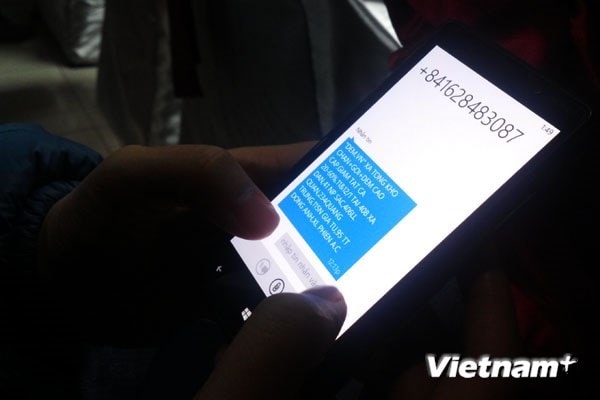Finding a solution to the "problem" of spam messages
Spam messages have been a real nightmare for mobile phone users in recent years. Although the management agency has taken many measures to deal with it, this problem continues to occur and shows no signs of abating.
| RELATED NEWS |
|---|
In fact, since September, their phones have received quite a lot of spam messages every day. Most of them are messages selling nice phone numbers, real estate, bedding, etc.
 |
| Spam messages continue to rage. Photo: Vietnam+ |
Blocking spam, have businesses really "taken action?"
Subscribers receive spam messages from all three major networks: Viettel, MobiFone, VinaPhone. The phone numbers used to send spam messages are mostly 11 digits, even 10 digits and prefixes 1800, 1900... However, in the message content, there is always a nice phone number (usually 10 digits) left so that subscribers can contact them again.
Nearly two years ago, telecommunications companies declared war on spam with the rather eloquent words: “Accept reduced revenue.”
VNPT's representative at that time said that they had built and deployed spam blocking software, capable of blocking spam messages based on keywords and the frequency of messages sent by subscribers. Viettel affirmed that they had built an anti-spam system based on the speed of messages and controlled about 60% of the message capacity...
On the government side, the Ministry of Information and Communications has also been very active by issuing many decisions, inspecting and handling businesses that spread spam messages. However, the inspection force is too thin and there is too much work to do. As for businesses, they talk strongly, but whether they act strongly or not is unclear, only the obvious reality is that spam still makes "Gods" suffer every day, even constantly increasing.
Inspection and punishment still kidnap and throw away the disk
There have been many regulations and drastic actions from the authorities regarding the issue of spam. The Hanoi Department of Information and Communications has repeatedly gathered phone numbers and prefixes that spread spam messages to request network operators to terminate contracts and block numbers… periodically every month.
Most recently, at the September State Management Meeting of the Ministry of Information and Communications held on October 6, the Ministry's inspectors said they had fined 3 businesses for spreading spam messages and lottery messages up to 240 million VND and would continue to fine 5 other businesses for similar acts.
Leaders of the Ministry of Information and Communications also requested inspectors to actively check and punish acts of spreading spam and scam messages to restore order in the field of information technology and digital content.
However, reality has shown that no matter how heavy the fine is, spam messages only decrease for a certain period of time, and then continue to cause trouble, making mobile users miserable.
So how to stop spam?
In fact, any mobile subscriber can use their SIM to send spam messages to other subscribers. As for the number spreading spam messages, it is definitely the intention of the business. Therefore, the network operator believes that dealing with the number spreading spam is easy, but for individuals it is very difficult…
Mr. Vu Ngoc Son, Vice President of Research and Development of Bkav, said that spam messages, whether direct (sim) or indirect (prefix), bring revenue to network operators. Therefore, network operators must really sacrifice profits for spam messages to decrease. In addition, the handling of spam messages by state management agencies needs to be more timely and stronger.
In the meeting on October 6, a representative of the Inspectorate of the Ministry of Information and Communications stated that as long as a Circular on the management of mobile text message prefixes is not issued, the problem of spam messages via prefixes will still be rampant.
Currently, the Ministry of Information and Communications is developing a Circular on the connection between Telco-CP (network operators and digital content providers), a Circular guiding Decree 77 on anti-spam... with clear regulations. And, these are documents that are expected to limit spam messages.
However, issuing documents to deal with the root cause of the problem is something that management agencies need to do urgently. However, it is unlikely that spam messages will be completely reduced without close coordination and, as Mr. Vu Ngoc Son analyzed, "the network operators themselves do not really sacrifice for "God".
According to Vietnam+
